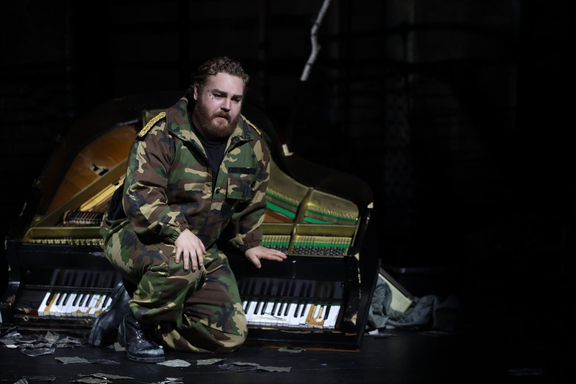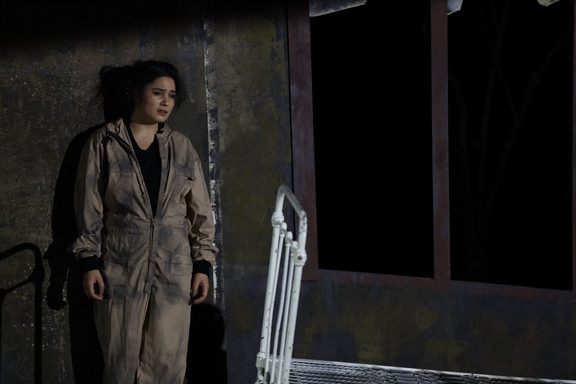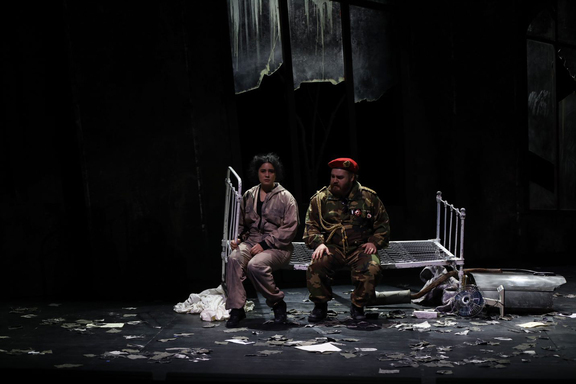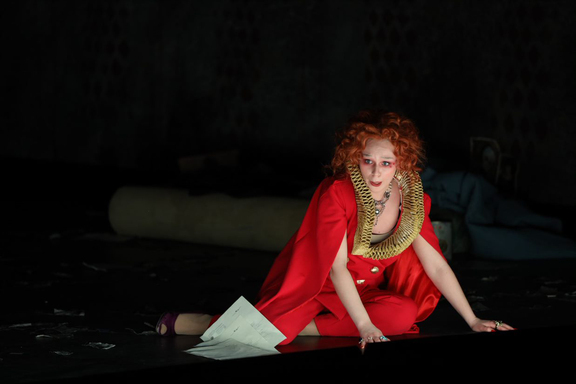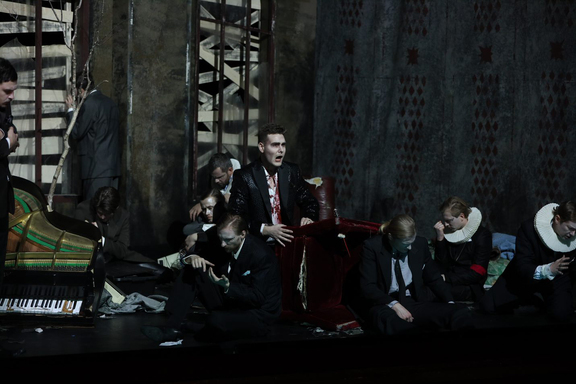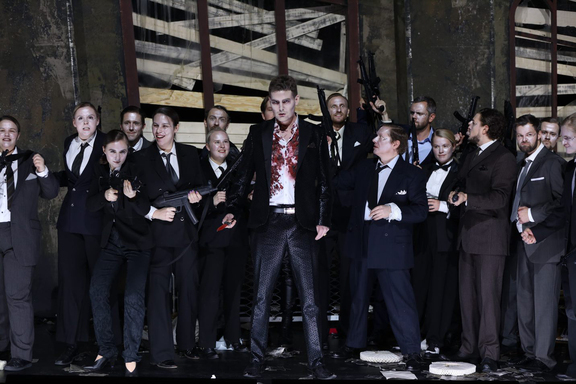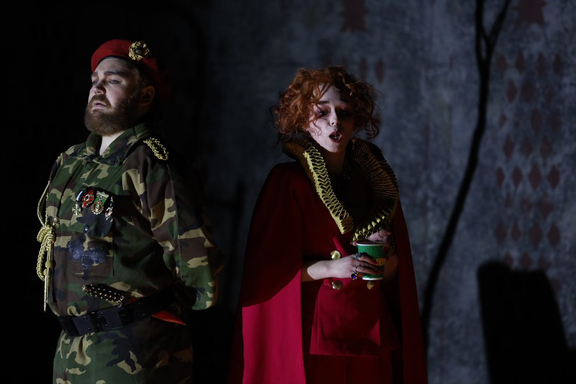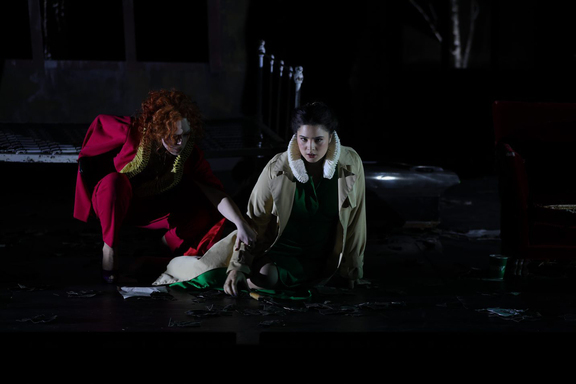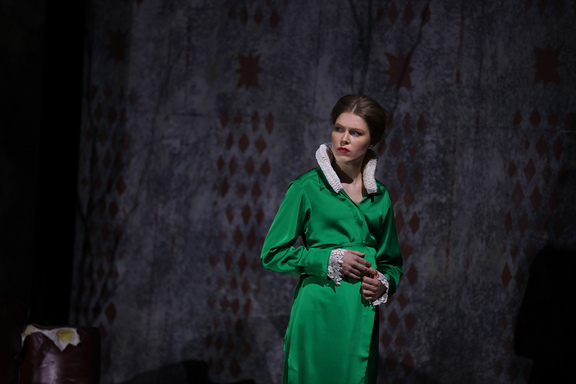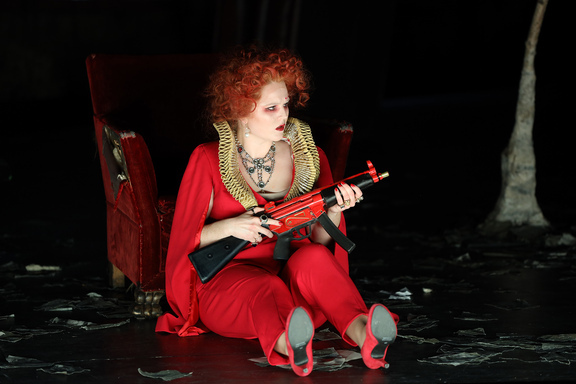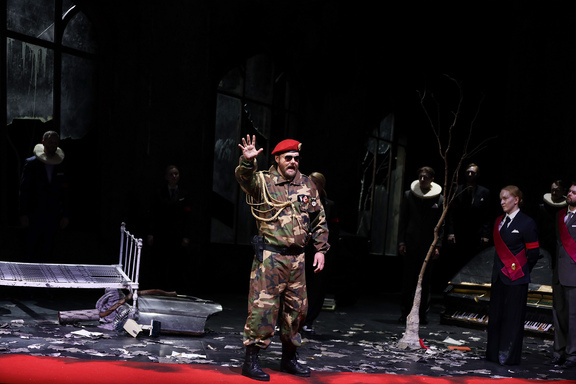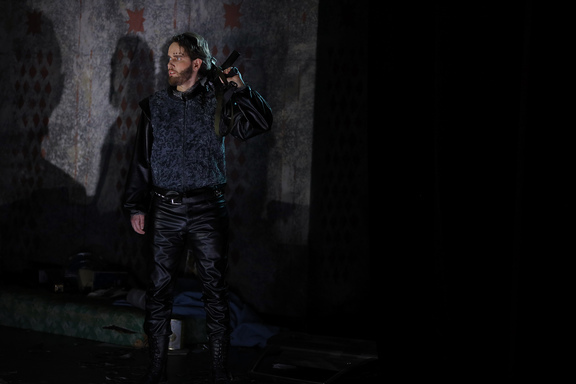Performance
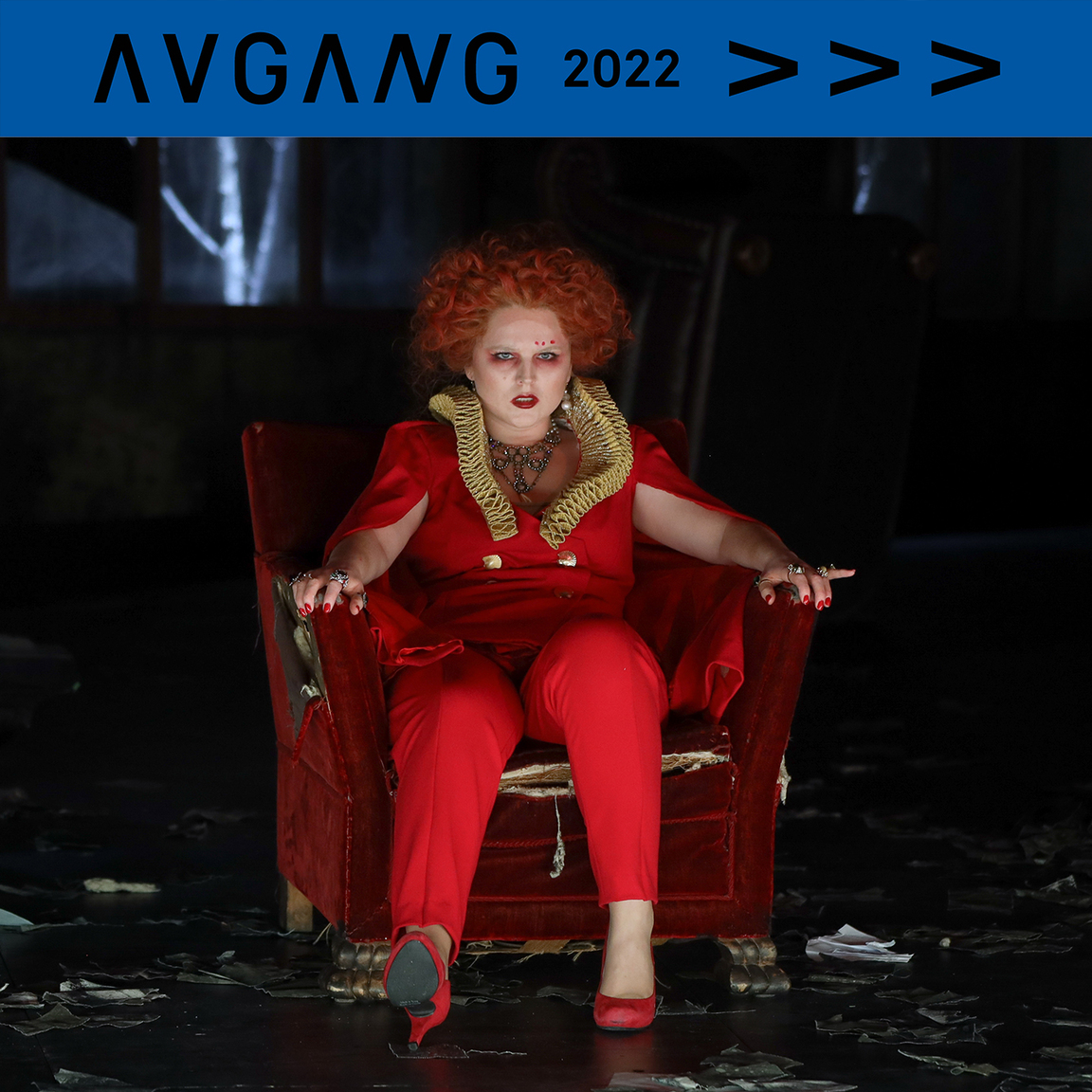
Avgang 2022: Elisabetta, regina d´Inghilterra
Operahøgskolens masterstudenter viser sin avgangsforestilling på Den Norske Opera & Ballett.
Operahøgskolen med Skandinaviapremiere! Operahøgskolen har valgt Rossinis Elisabetta, regina d´Inghilterra (Elisabeth, dronningen av England) når de gjester Scene 2 i DNO&B – og det er første gang at denne operaen settes opp i Skandinavia.
Dronning Elisabeth elsker jarlen av Leicester – som feirer sin seier over den skotske fienden. Gjennom konspiratoren Norfolk oppdager hun imidlertid at han i hemmelighet er gift med Matilda, datter av dronning Mary av Skottland. Elisabeth tilbyr Leicester ekteskap for at han skal kunne redde seg fra dødsstraff, men både Leicester og Matilda sverger begge at de heller dør enn å bli separert. Til slutt er det Norfolk som blir dømt til døden, mens Leicester, Matilda og de andre skotske krigsfangene blir benådet.
Denne operaen var den første av ni operaer som Rossini skrev for Teatro San Carlo i Napoli (1815), i en alder av 23 år. Noe av musikken i Elisabetta hentet Rossini fra andre verk han hadde skrevet, og gjenbrukte motiver også i senere operaer: Blant annet kan man høre deler av Elisabettas første arie i Rosinas arie “Una voce poco fa” i hans opera Barberen i Sevilla, og også i den samme operaens ouverture.
Medvirkende
Libretto: Giovanni Schmidt
Musikalsk ledelse: Gregor Bühl
Regi: Jacopo Spirei
Scenografi: Mauro Tinti
Kostymer: Line Maher
I rollene:
Elisabetta Elina Korbi (17.02, 19.02) Eva Langeland Gjerde (18.02, 20. 02)
Leicester Markus Bjørlykke (17.02, 19.02),
Robert Skovly (18.02, 20. 02)
Matilda Flora Anna Crocker Ångman (17.02, 19.02) Hannah Agnethe Pold (18.02, 20. 02)
Enrico Carmen Lázaro Alemani
Norforlk Endre Aaberge Dahl (17.02, 19.02)
Alfonso Zambuto (18.02, 20. 02)
Guglielmo Martin Enger Holm (17.02, 19.02,
Johan Kyhle (18.02, 20. 02)
Musikalsk assistent: Kristoffer Nikolai Wøien
Regiassistent: Julie Sofie Storemyr
Musikalsk innstudering: Luca de Marchi, Olesya Tutova
Kor: Caroline Olava Halvorsen, Tea Ban, Amanda Schmidiger Hansen, Joel Torby, Vegard
Berggård, Christopher Straume, Svatoslav Grabovsky, Jonas Norlin, Andreas Holmefjord, Sivert Høyum, Johannes Nikolai Aas, Ema Delac,Jostein Fahre, Filip Natanael Håkestad, Veronika Karlsen, Sofia Nesje Enger, Oda Nysæter, Violetta Peschanskaya, Pauline Reidun Strand Aase, Viktoria Veronika Anchissi Joner, Thea Bøgeberg Brix, Iris Björk Gunnarsdottir, Martin Enger Holm, Karen Mathilde Heir Hovd, Simon Thorbjørnsen
Musikkhøgskolens symfoniorkester:
Violin 1: Kaja Østervold, Ragna Rian, Diana Moisejenkaite / Violin 2: Kamila Owsiany, Ellen Samdal, Katherine Wang / Viola: Charles Galante, Agnes Pavelich / Cello: Marek
Bienkunski, Johannes Borchgrevink / Bass: Martin Ulltang, Wilhelminah Findal-Fossmo
Fløyte: 1.fløyte, piccolo: Amalie Duesund, 2.fløyte, piccolo: Øyvind Velsrud
Obo: 1. obo, eng. hn: Sofie Garby, 2. obo, eng. hn: Aurora Remme / Klarinett: 1. Karen Elise Fridtjofsen, 2. Tessa Kokkonen / Fagott: 1. Jonathan Sandqvist, 2. Kristian Bøkseth
Horn: 1. Sandra Trøan, 2. Isak Malinowsky, 3. Emilie Ofstad Wold, 4. Sverre Christiansen
Trompet: 1. Henrik Olsen Åsaune, 2. Hedda Simonsson / Trombone: 1. Viking Stjernfeldt ,
2. Guro Kitterød, 3. Iver Holsbrekken / Slagverk: Elias Voll, Arild Bjørkelo, Sebastian
Lindland / Hammerklaver: Luca de Marchi
Synopsis (engelsk)
Elisabetta regina d’Inghilterra, dramma in two acts to a libretto by Giovanni Schmidt, was first performed at Teatro San Carlo, Naples, on 4th October 1815. The story is taken from a romance of Carlo Federici, taken by The Recess by Sophia Lee. Rossini was the conductor of this opera on 1822, Kärnthnertortheater, Wien. The action takes place in London during the reign of Queen Elizabeth I.
Act I
The throne room. The ladies and gentlemen of the court are rejoicing: under the leadership of Leicester, their general, the Queen’s armies have won a military victory that will finally subdue Scotland entirely to English rule. The Duke of Norfolc alone cannot conceal his disappointment; he is secretly envious of Leicester’s rising fortunes. Guglielmo, captain of the royal guard, is the only one to have guessed at Norfolc’s concealed duplicity. Hailed by all, Queen Elizabeth comes in with her lords and ladies in waiting; she declares her satisfaction in the victory, but privately she is also delighted at Leicester’s return, for she is secretly in love with him. The general himself, received with due honours, appears before the Queen to inform her of the victory, and restores to her his marshal’s baton; the Queen rewards him with a decoration, then receives the homage of some Scottish nobles, distinguished hostages of war. Looking over them, Leicester is astonished to discover among their number Matilde, the wife he has wedded secretly, now in male attire together with her brother Enrico. When the Queen and her courtiers retire, Leicester remains alone with Matilde and scolds her for her rashness; in fact she is the daughter of Mary, Queen of Scots, and therefore banished from England like all the descendants of the beheaded Scottish Queen. Matilde explains that she has rushed to her husband’s side because of insistent rumours that Elizabeth is in love with him; Enrico, joining them, adds that he was unable to restrain her, so he came with her to protect her. Leicester decides that he must not be seen in the company of his wife and brother-in-law, to avoid arousing suspicion; it will be better to ask the advice of Norfolc, whom he believes to be a true friend. Matilde, who is rather upset, trusts that the future will bring peace of mind.
The royal apartments. Leicester confides in Norfolc, telling him how he met Matilde in a humble shepherd’s dwelling; believing her to be his daughter he allowed himself to fall in love with her; when he learned that the apparent shepherd was a Scottish nobleman in disguise, he asked for the girl’s hand in marriage; the old man revealed the true identity of the supposed shepherdess and her brother: they were the children of Mary, Queen of Scots. Leicester, however, touched by the fate of the young people, went ahead with his plans to marry the girl. When Norfolc is left alone he is overjoyed at having been entrusted with these secrets; whilst he pretends to be a friend of Leicester’s, he really hates him and envies his undeserved good luck. Seeing the Queen approaching, he decides to taste revenge; with astute hypocrisy he tells the Queen of Leicester’s secret marriage with the daughter of Mary Stuart. Feeling herself betrayed in love and also in loyalty by her subject, Elizabeth decides to condemn her beloved Leicester to death; Norfolc exults.
The Queen orders Guglielmo to summon Leicester before her and to hold the royal guard ready. The general enters together with all the courtiers, including the Scottish noblemen with Matilde and Enrico concealed among their ranks; the Queen easily spots her rival. She turns to Leicester, announcing that the time has come to reward him for his loyalty, then has a tray brought on covered with a cloth; lifting the veil, she reveals the crown and sceptre, which she offers to Leicester, saying that he will be her husband and England’s King. To everyone’s amazement Leicester refuses the Queen’s offer in hesitant and embarrassed words. The infuriated Queen drags Matilde into the middle of the room, accuses the general of treason, and consigns the pair of them to the guards. Despite all Leicester’s pleading, Matilde and Enrico are separated and arrested; in the general uproar, Elizabeth finds her only comfort in the idea of vengeance.
Rooms. Elizabeth orders Guglielmo to bring in first Matilde, then Leicester. And now Matilde comes on, ready to hear Elizabeth’s sentence; the Queen reminds her rival that the scaffold is ready waiting for her and her brother, the Queen’s enemies, and for her husband, a treacherous subject. However, the Queen is disposed to grant pardon to all three, on condition that Matilde consents to write a letter renouncing all claims upon Leicester’s heart. Matilde begs in vain to be the sole victim of Elizabeth’s vengeance; the Queen is obdurate. So Matilde is reluctantly obliged to write the letter to the Queen’s dictation. When Leicester now comes on, Elizabeth urges him to repent and follow Matilde’s example. When he reads the letter Leicester is overcome with furious pride and tears it up, declaring that death would be preferable to such coercion. Infuriated, the Queen threatens both of them with death and has them locked up in prison again.
Guglielmo announces that Norfolc begs audience of the Queen, but Elizabeth would rather not receive him; she sees clearly that however guilty Leicester might be, Norfolc has behaved badly to him, proving to be a false friend and a spy; she therefore instructs Guglielmo to inform him that the next day he will be banished from her kingdom. The captain of the guard is overjoyed at this, as he has long understood Norfolc’s true character.
An atrium beside the prison. The townsfolk and the soldiers mourn the unhappy fate of Leicester, condemned to death in spite of his services to the country. Jealous of his enemy’s widespread popularity, and embittered by the thought of his impending exile, Norfolc harangues the mob, convincing townsmen and soldiers to force the gates of the prison to free the unfortunate general, unjustly condemned by the Queen. The fact is that he is harbouring a secret plan for vengeance.
Inside a spacious prison. Leicester is bemoaning his fate, his good fortune overturned in the space of a few hours; in a trance, he invokes his wife, then rudely awakens to grim reality. Norfolc comes in, and succeeds in persuading him that far from having betrayed him to Elizabeth, he has begged her to pardon him. He orders two sappers to break down the door of the cell where Matilde and Enrico are imprisoned. Leicester is grateful for these signs of friendship, and Norfolc tells him that soon the people will come and set him free. The general, however, refuses this unexpected help; his loyalty to the throne will not permit him to disobey the Queen’s edicts, and he rejects Norfolc. The latter, turning threatening, pretends to withdraw. Instead he hides, seeing that the Queen herself is about to avail herself of a secret door to come to talk to the prisoner; nobody observes that Matilde and Enrico, peering out of their cell, also listen in to the conversation Elizabeth explains to Leicester that whilst her duty as Queen forces her to condemn him, as a woman her desire is to help him to escape secretly. But Leicester declares that he has no desire to be a rebel to the throne; he rather asks the Queen to be merciful towards his wife and brother-in-law. Elizabeth, however, declares that she cannot spare them; she explains that the very same Norfolc who accused Leicester himself has indicted them before the House of Lords as accomplices. In this way the general learns the true nature of his supposed friend, and tells the Queen how the treacherous man has incited the townspeople to revolt; seeing himself lost, Norfolc draws his sword intending to attack the Queen, but Enrico and Matilde rush out of their cell to obstruct him, whilst Leicester shields the Queen with his own body. Elizabeth calls out for Guglielmo, and the guards rush in to arrest the wouldbe regicide, to whom the sovereign promises torture and death. She then pardons her general and the children of Mary Stuart, recognizing their generous loyalty, and allows husband and wife to embrace. Unexpectedly the crowd bursts in, calling aloud for Leicester to be freed; the general himself quietens the mob, and all kneel before the Queen. Elizabeth gives the people back their hero. Acclaimed by all, she decides quietly to banish for ever all worldly love from her heart and to dedicate herself to kingly virtues.
Teknisk stab
Teknisk produsent: Kjetil Skåret
Inspisient: Jan-André Strand
Rekvisitør: Kikki Noren Løwgren
Scenemester: Are Skaanes Engebretsen
Snekker: Anders Hamre, Christopher Reita
Male: Olivier Marcoullier
Smed Atle Berger Martin
Påkleder DNO&B: Tove Gjøsund
Maskører DNO&B: Julie Sand Johnsen, Livinger Echo Ferner Diesen
Scene DNO&B: Atila Habibzadeh, Øyvind Olsen
Lysavvikling DNO&B: Theo Kyratzis, Harald LieSkjult tekst
De sceniske elementene er produsert ved Kunsthøgskolen i Oslos scenetekniske verksteder.
Operaen fremføres på italiensk.
Forestillingen er i samarbeid med Norges musikkhøgskole.
Foto: Stephen Hutton

